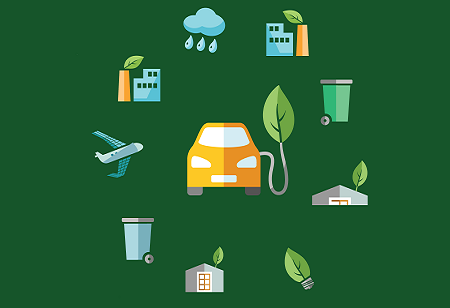The Glasgow agreement of the recently held 26th UNFCCC Conference of the Parties (COP26) concluded that the world is not doing enough to tackle the climate challenge. With ever increasing population and boosting industrial and infrastructural developments, the globe is now more dependent on
fossil fuels than ever before. According to an inter-governmental report on global warming, an average of 89% of the world's carbon emissions comes from fossil fuels and industry alone. On average, 1/3rd of the total carbon emissions in the world are from the combustion of fossil fuels.
In India the picture is not much different.Today, more than 60% of the country’s electricity is generated by burning fossil fuels. Coal alone accounted for nearly 50%. A recent survey by Harvard School states that 30% of fatalities in India are due to air pollution caused by fossil fuels. The country needs to actively transform its energy production into renewable sources, and in the current scenario,
Biofuel seems to be the feasible way.
Having said that in this article, let's look at the key trends in the biofuel industry that shape the future of biofuel production.
Microalgae based Biofuel production
Microalgae have a much higher potential for producing TAG (Triglycerides) for biodiesel production than traditional oil crops.
Microalgae have long been known to accumulate TAG oil when subjected to stress conditions such as nitrogen deficiency. Scientists have been attempting to achieve similar amounts of oil buildup without the use of stress induction, as stress causes cell death and slows development. The procedure would become more economically feasible if oil production could be induced without the requirement for unfavorable circumstances.
In India a team of scientists led by T Mathimani from the National Institute of Technology (NIT), Tiruchirappalli, have successfully developed low-cost biodiesel from microalgae. The team have isolated predominant strains of marine microalgal species namely Picochlorum sp., Scenedesmus sp., Chlorella sp., from the coastal regions of Tamil Nadu for their potential in terms of total organic carbon content, and Triacylglycerides(TAG)
content for biodiesel production.
They're currently concentrating on alternative microalgal prospects with numerous biotechnological applications and lipid extraction utilizing a switchable polarity solvent (SPS) technology. SPS is an environmentally friendly switchable solvent that may be recovered without the need of any thermal procedures and reused as a green solvent for algal lipid extraction.
Magnetic nanocomposite (MNC) may be utilized for several cycles of algal dewatering, and its treated culture solution can be reused to drastically reduce biodiesel production cost. These three techniques would be taken into account in their research on biodiesel production that is both sustainable and low-cost.
Non-edible Seeds as Potential Source
Currently, biofuels are mostly made from vegetable oils and animal fats. However, deriving biofuels from the edible seeds can be problematic for the future, as massive hikes in the use of edible oil can lead to a surge in price.
To overcome this situation, a team from IIT led by Dr. Kaustubha Mohanty, Professor, Department of Chemical Engineering, IIT has developed methods to produce biofuels from non-edible seeds.
“The demand for biofuel is expected to increase in future and it is certainly not sustainable to generate them from food sources. However, we found that many non-edible seeds had a high amount of oil in them, which was exciting”, says Dr. Mohanty.
“Oils derived from non-edible seeds of plants can be used to produce biofuels, to eliminate the competition between food and fuel”, he adds.
Peela kaner, mahua, gulmohar, neem, rain tree, castor, kusum, and other Indian plants/trees yield seeds with oil that may be used to make biofuels. Dr. Mohanty and his research team employ a heat-chemical approach to make biofuels from these and other seeds that they harvest meticulously around the country. To make biofuel from these oils, the researchers devised a low-cost pyrolyzer.
Although the aforementioned groundbreaking research finding can lead the nation to attain a scalable biofuel pipeline in the near future. There are some hurdles that can halt the overall development.
BioCNG production
Due to poor supply chains and low collection efficiency,presently, there are concerns around feedstock supply and quality. Fluctuations in feedstock availability and quality might impede plant production efficiency, affecting plant profitability in the long term. Also, decrease in the number of farm animals in rural areas, leading to failure of supply of the committed quantity of waste to plants is one of the reasons for the closure of biogas plants.
The Future Roadmap
The importance of developing a strong biofuel sector in India to solve challenges of energy security and fuel self-sufficiency has long been recognised. Despite the fact that the food vs. fuel debate is a global hot topic, it is mostly irrelevant to India's biofuel production programme because of the country's conscious decision not to use any edible feedstock for bio-energy production, which also serves as a limitation.
Some of the above-mentioned hurdles may be overcome by the implementation of new policies and strategies, or the adjustment of current tactics. In order to grow India's biofuel business, mandated biofuel blends with conventional petrol, as well as discounted prices, should be made mandatory.
